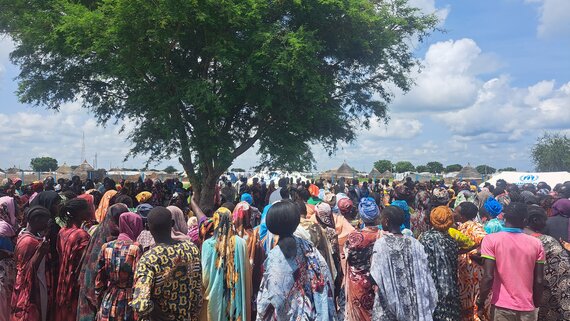Summary of need
The Abyei region remains a contested area between Sudan and South Sudan, with its political future and final status still unresolved. A proposed joint administration from a 2011 agreement still needs to be established, with separate administrations appointed by both Juba and Khartoum struggling to provide basic services. The region grapples with frequent violence from armed elements, climate change-induced disasters, and economic hardships driven by high inflation in Sudan and South Sudan. The international community serves as the primary provider of life-saving assistance and protection, although access challenges, limited resources, and unequal aid distribution persist.
In 2024, given the conflict in Sudan and strained resources, coordinated humanitarian efforts between South Sudan and Sudan will remain challenging. Humanitarian assistance will be extended from both countries to cover Abyei's entire area, accommodating around 280,000 individuals in need of humanitarian assistance. Conflict, loss of livelihood, and displacement compounded by the influx of returnees from Sudan, will continue to increase vulnerability in 2024. Climate change exacerbates these issues, with floods and livestock diseases disrupting the local economy and increasing food insecurity.
Humanitarian efforts in Abyei aim to alleviate suffering, reduce dependency on aid, and cover health, nutrition, WASH, agriculture, livestock, protection, and education. It considers conflict dynamics, returnees, refugees, climate, seasonal migration, and livestock's role in the local economy. Humanitarian and recovery agencies will focus on revitalizing economic activities and enhancing income-generating opportunities to improve livelihoods. This comprehensive response seeks to address the complex and interconnected challenges facing Abyei's population.
Strategic Objectives
- Provide timely, life-saving assistance to crisis-affected vulnerable people.
- Enhance access to essential services and livelihoods for vulnerable communities.
- Strengthen emergency preparedness across sectors, including advocacy, contingency planning, and addressing logistical challenges.
- Facilitate a comprehensive humanitarian response by engaging with state governments, administrative authorities, traditional leaders, and non-state actors to secure the safety of humanitarian teams and facilitate cargo flights into Abyei.

Abyei Administrative Area
South Sudanese returnees arrive in the Abyei Administrative area after the Sudan crisis, exacerbating the humanitarian situation.
OCHA/Brimo MajokResponse priorities
Response priorities will include life-saving humanitarian services to reduce morbidity and mortality by increasing access to quality health care, and nutrition interventions and strengthening health facilities. Nutrition response will aim to mitigate malnutrition risk in vulnerable populations through various programs, including treatment of acute malnutrition and infant and young child feeding support. WASH assistance will focus on improving access to safe drinking water and adequate hygiene and sanitation practices, particularly in areas affected by displacement and migration to prevent conflicts over shared resources and disease outbreaks. Protection will be mainstreamed in all interventions, with a focus on women, children, and the most vulnerable, while addressing the risks associated with landmines and ERW. In addition, partners will establish services for protecting girls and women, develop referral pathways, and enhance awareness and capacity among community leaders and partners. Education partners will focus on increasing access to primary education and vocational training for crisis-affected children. FSL interventions will provide food to vulnerable populations in crisis and extreme food needs. Some assistance will support livelihoods during the dry season and veterinary health services. Partners will promote synergies between humanitarian assistance, development, and peacebuilding efforts through complementarity between various initiatives, including the UN joint program and UNISFA projects.

